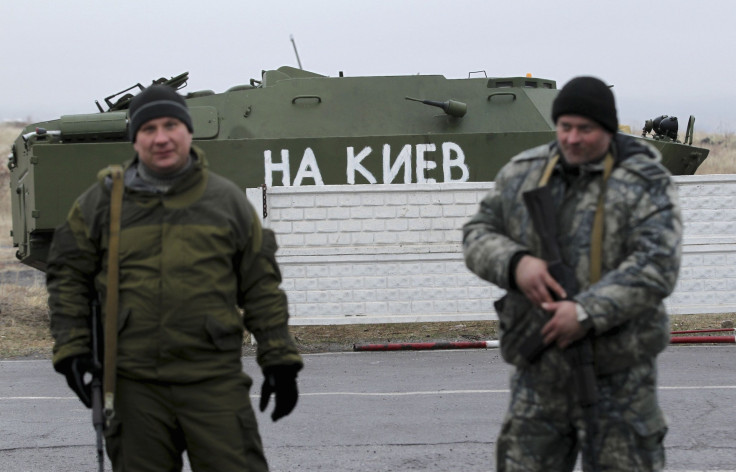Pro-Russian Rebels Commence Russia-Backed Offensive On Donetsk

Any hopes of salvaging September’s ceasefire in East Ukraine seemed to disappear Friday as pro-Russian separatists mounted a major offensive on Ukrainian Army-held positions in Donetsk. Early indications from NATO suggest the offensive is being backed by Russia, as heavy weapons have been seen crossing the border from Russia to Ukraine.
The fresh attacks come in the wake of comments from rebel leader Alexander Zakharchenko, who said the separatists will no longer engage in any more ceasefire talks. "We will strike out until we reach the border of the Donetsk region,” he said, talking to RIA Novosti, on Friday. “If I see any threat to the Donetsk area from any settlement, I will destroy the threat where it is.”
The advances by rebel forces, who began attacking the Ukraine government-held town of Mariupol in southern Ukraine Friday, are likely to undermine a tentative peace deal signed earlier this week in Berlin between foreign ministers from Ukraine, Russia, Germany and France. The deal means that the Ukrainian Army and pro-Russian rebels would withdraw heavy arms from locations within nine miles (15 km) of the demarcation line, but the deal did not include troops.
While a ceasefire had been in place theoretically since September, the fighting has never stopped entirely. In fact, intense fighting in and around Donetsk airport, which is now reported to be in the hands of rebels fighters, has been symbolic of a war that rarely slowed down. The United Nations reported Friday that more than 5,000 people have died since fighting began, in April 2014, with 260 of those deaths coming in the past nine days.
"A significant escalation of the violence has increased the number of victims up to 5,086 people, and we are afraid that the real figure may be much higher," Rupert Colville, spokesperson of the U.N. High Commissioner for Human Rights, said at a press conference in Geneva on Friday.
While Russia has denied being involved in supporting pro-Russian troops, the evidence against the country is now plentiful, according to the Organization for Security and Cooperation in Europe (OSCE). NATO Gen. Philip Breedlove, the group’s top military commander, said as far back as November that he was “concerned about convoys of trucks taking artillery and supplies into East Ukraine from Russia.”
In the face of the renewed attacks, the Ukrainian military has positioned itself to defend the front along the Donetsk border, where Zakharchenko is expected to push his rebel troops, according to the Ukrainian Independent Information Agency.
Yevgeny Deydey, a Ukrainian MP and commander of the pro-government volunteer battalion Kyiv-1, told Newsweek Friday that pro-Russians had begun a tank offensive and were moving towards Mariupol. “I do not rule out that separatist attacks in other territories held by Ukraine are a diversion tactic,” he said, while also mentioning that the town of Talakovka, which lies between Mariupol and Donetsk, was “being shelled hard.”
As the battle for Donetsk airport was coming to a close, OSCE monitors reported Thursday that a soldier evacuated from the airport said he and 80 other soldiers there complained of “uncontrollable muscle spasms, vomiting and difficult breathing," possibly indicating a chemical attack. A spokesman for the OSCE told IBTimes that the group was “still assessing the reports.”
© Copyright IBTimes 2025. All rights reserved.






















